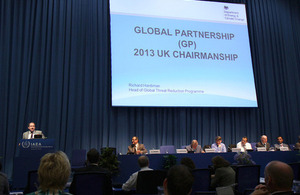UK chairs the Global Partnership against the spread of materials and weapons of mass destruction
UK nuclear experts present to the International Atomic Energy Agency Nuclear Security conference in Vienna, Austria. July 2013.

Richard Hardiman speaking at the IAEA Nuclear Security conference, July 2013, Vienna, Austria
The UK Mission to the United Nations in Vienna (UKMIS) represents the UK at the International Atomic Energy Agency (IAEA). At this year’s IAEA conference on nuclear security the UKMIS team hosted over 40 UK field and industry experts as they participated in talks and discussions.
Richard Hardiman, head of the UK Global Threat Reduction Programme from the Department of Energy and Climate Change, gave a keynote speech to explain the UK 2013 nuclear security priorities as chair of the G8 and the Global Partnership against the spread of weapons and materials of mass destruction.
IAEA conference on nuclear security, 1-5 July 2013, Vienna, Austria
“2013 is an exciting and very busy year for the UK because we have presidency of the G8 group of nations. Along with that goes the chair of the Global Partnership against the spread of weapons and materials of mass destruction.
We are trying to implement practical measures and our focus is on improving co-ordination of international efforts in the field of nuclear security and facilitating support to those areas that need it.
We’ve so far run two working groups, one in February and one in June in London. We have one more in October which will continue this facilitation but will also look at encouraging the responsible science in the nuclear and materials of mass destruction field and the continued spread of international knowledge without, unintentionally, allowing the spread of information that could help those who wish to harm us.
The UK can bring to bear a wide range of expertise. We are an experienced nuclear state and we have a lot of experience of developing nuclear power in a peaceful way and then managing the legacy from it in a secure manner. We are able to tap into experts and consultants from a wide range of expertise from radioactive source security to improving the physical security of very, very sensitive nuclear sites, to raising the capability and the capacity of security workforces and in drawing up plans for dealing with nuclear security.
The UK makes contributions to the IAEA’s Nuclear Security Fund in what are called extra-budgetry arrangements which means that we do it on a voluntary basis. We are a leading funder of the Nuclear Security Fund because we believe that nuclear security globally is an extremely important subject. We also believe that the IAEA should be the leader in this field and should be resourced appropriately. Our latest contribution was in March of this year and was a total of £3 million. That funding goes towards a wide range of activities but it’s essentially about implementation of nuclear security and providing advice. It may be to assist advisory missions to states but also to help provide radiation detection at borders, to help improve the security of radioactive sources and to provide security of civil nuclear sites. We are very engaged in ensuring that the funding is delivered to the highest priorities and that the British taxpayer receives value for money. That is a quite a major part of my work.”
Further information:
Updates to this page
-
Slight text changes to improve clarity.
-
First published.